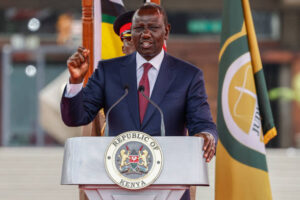
By Derrick Wanjala
The streets of Nairobi and other major cities in Kenya have been buzzing with activity as young people, particularly those from Generation Z, lead demonstrations against the newly proposed Finance Bill.

The bill, which includes several contentious measures, has sparked widespread anger and frustration among the populace, highlighting the country’s ongoing struggles with unemployment and economic instability.
Nairobi, Kenya – In recent weeks, thousands of young Kenyans have taken to the streets in a series of protests against the proposed Finance Bill. The bill, which seeks to introduce new taxes and increase existing ones, has been met with fierce resistance, especially from Generation Z, who argue that it will exacerbate the already dire economic situation in the country.
Unemployment and Economic Struggles.
Kenya has been grappling with high unemployment rates, particularly among its youth. According to recent statistics, nearly 40% of young people are unemployed, a situation that has been further worsened by the economic impacts of the COVID-19 pandemic. The proposed Finance Bill is seen as a further blow to their prospects, as it threatens to increase the cost of living and reduce disposable income.

Generation Z at the Forefront.
Generation Z, the demographic cohort born between the late 1990s and early 2010s, has emerged as the driving force behind these demonstrations. With their adept use of social media and digital platforms, they have organized and mobilized large crowds, spreading their message quickly and effectively. Their activism is not only a response to the Finance Bill but also a broader call for systemic change and economic justice.
Voices from the Protests.
At a recent protest in Nairobi, 23-year-old ,Amina Mwangi shared her concerns. “We are already struggling to find jobs and make ends meet. This Finance Bill will only make things worse for us. It’s time for the government to listen to our voices and address the real issues we are facing.”
Another protester, 21-year-old John Otieno, echoed these sentiments. “We need opportunities, not more taxes. The government should focus on creating jobs and supporting small businesses instead of burdening us with more financial strain.”
Government Response.
The government, however, has defended the proposed Finance Bill, arguing that it is necessary to address the country’s budget deficit and fund essential public services.
Escalating Tensions
Despite these assurances, tensions continue to escalate. The protests have occasionally turned violent, with clashes between demonstrators and police resulting in injuries and arrests. Human rights organizations have condemned the excessive use of force by security personnel and called for peaceful resolutions to the unrest.
Call for Dialogue.
Amid the chaos, there are calls for dialogue between the government and the protesters. Civic leaders and community organizations have urged both parties to come to the negotiating table and find a mutually agreeable solution. They emphasize the importance of addressing the underlying issues of unemployment and economic hardship that have fueled the demonstrations.
A Nation at a Crossroads.
As Kenya stands at this critical juncture, the outcome of these protests will have significant implications for the country’s future. The young Generation Z activists are determined to make their voices heard and demand a better future. Whether the government will heed their call and implement meaningful changes remains to be seen.
Conclusion.
The ongoing demonstrations against the Finance Bill have brought to the forefront the deep-seated economic challenges facing Kenya, particularly its youth. Generation Z’s leadership in these protests underscores their frustration and desire for a better economic future. The resolution of this conflict will be crucial in shaping the direction of the country’s economic policies and the well-being of its citizens.




